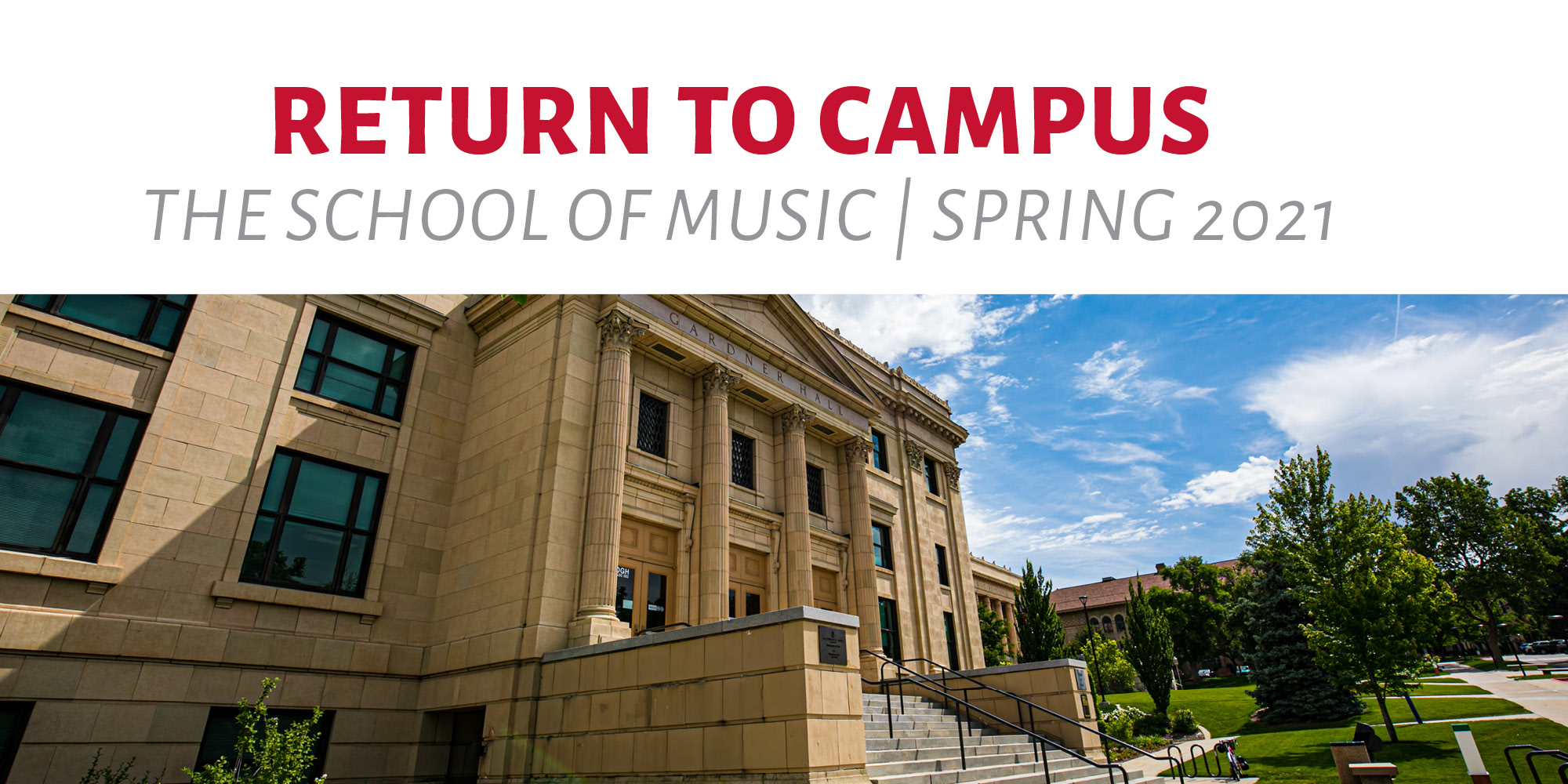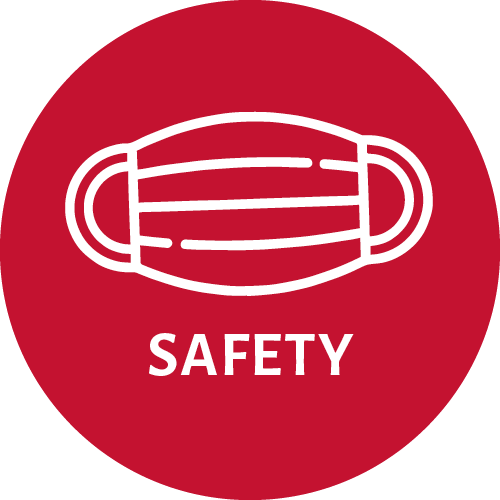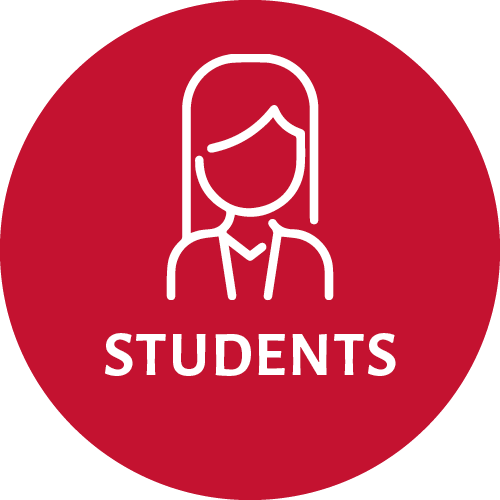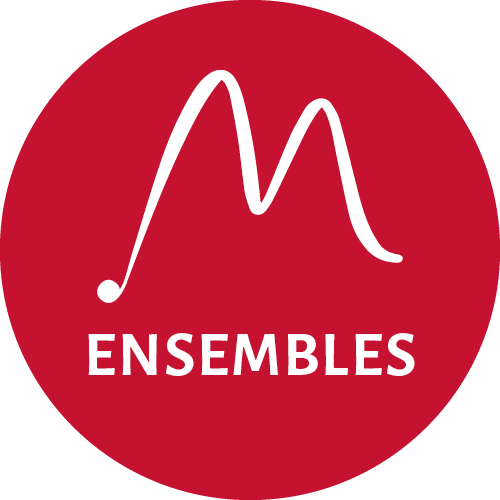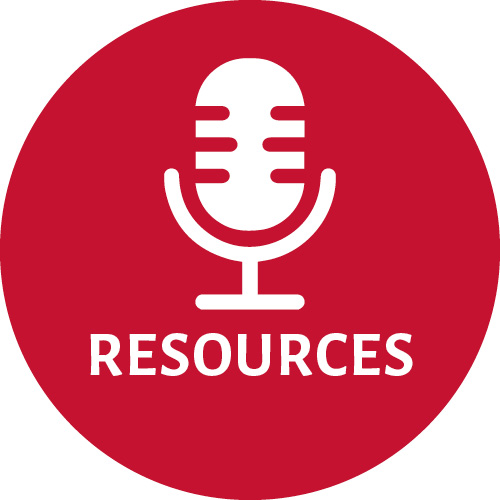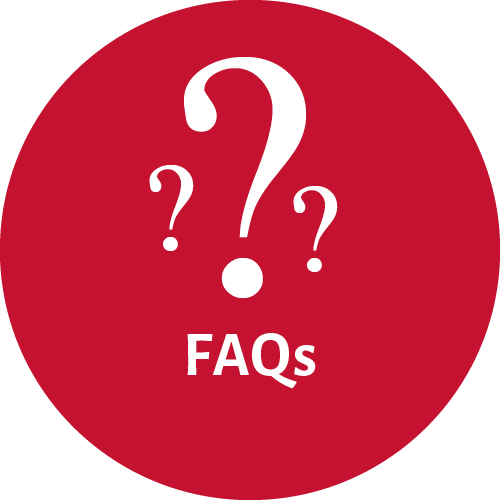School of Music COVID-19 Updates and Guidance
The School of Music is preparing for your safe return to campus in Spring 2021. Below is information providing answers to many questions we are receiving from Music students. This information will be updated as the circumstances surrounding the COVID-19 pandemic change. We appreciate your patience. We strongly recommend adding important email addresses (School of Music administrators, your Spring Semester instructors, College of Fine Arts Office) to your contacts, and making a habit of checking your Umail regularly throughout the day—including your junk folders. Please note that all email announcements will be sent to your Umail account, only.
Our first and foremost concern is your safety. Our second priority is to provide an outstanding education in music that provides an effective path to graduation. We have crafted a student-centered plan that maximizes performance opportunities, while observing best practices in the use of masks, social distancing, hand-washing, and room ventilation. This plan minimizes interactions beyond the School of Music community and implements safeguards to curtail potential disruptions to your education. The plan preserves the 15-week semester, although in a non-traditional configuration.
As we adapt to the extraordinary instructional and performance strategies that the pandemic has compelled us to embrace this year, an important School of Music priority is the wellbeing of its students. As faculty members teach their courses and lead their ensembles this spring, they will carefully consider the ASUU Recommendations from Students, included in a resolution adopted in December 2020 by the University of Utah Academic Senate.
The School of Music strives to provide learning environments that promote student wellness. In Spring 2021, as part of its Student Success Initiative, the School of Music will present Zoom sessions on wellness topics, selected through a survey sent to Music students in Fall 2020.
We may see each other less often in person next semester than we would under other circumstances, but we remain a community of musicians. If you have any questions that are not answered below, please email Dr. Jared Rawlings, Associate Director, at j.rawlings@utah.edu
University of Utah Spring 2021 Modalities of Class Instruction
In the Schedule of Classes for Spring 2021 you will notice that the University of Utah has changed how instruction for many courses will be delivered and it has categorized courses into five (5) modalities of instruction. Listed below are the five (5) modalities of instruction you will find in the Spring 2021 Schedule of Classes. Three (3) of these modalities include in-person instruction and two (2) of these modalities involve remote instruction, exclusively.
Classes using the following modalities of instruction include in-person instruction:
1. In-Person—class is fully in-person (course content must be available for students unable to attend).
2. IVC-Hybrid—class is a mixture of in-person, and synchronous online modalities.
3. Hybrid—class is a mixture of in-person and asynchronous online modalities.
Classes using the following modalities of instruction include remote instruction only:
4. IVC (Interactive Video Conferencing)—class is online through a synchronous delivery of instruction using technology (class has a time, with canvas as the location).
5. Online—class is free of time and place restrictions, and all content is delivered via technology. No synchronous meetings.
Because online components will be part of many classes, students will need access to a computer and a good internet connection. The Marriott Library has computers and other electronic equipment available for student check-out.
University of Utah Spring 2021 Academic Calendar
School of Music Return to Campus Spring 2021
The guidance provided below pertains to School of Music safety measures, academic courses, performance courses, and performances. We strongly encourage you to stay updated on the University Utah’s Covid-19 guidance. Please visit the University of Utah Covid-19 Central @theU for updates.
Below you will find School of Music protocols and safety measures currently in place. All measures are being implemented in accordance with mandates and guidance from federal and local authorities. We will continue to monitor these sources and consult others. If the guidance on best practices changes, we will adjust accordingly, and some of these practices may or may not be in effect by the time campus fully reopens for the semester.
We have strong relationships with local health departments and our own University Environmental Health Services Team, who we are staying in constant contact with to ensure that everything we are doing to prevent the spread of COVID-19 meets or exceeds their guidelines. Watch our general safety video below.
(Use YouTube Gadget or Insert/Edit Video on the toolbar to embed video code.)
All University of Utah students are required to complete a mandatory safety checklist. The most important measures to reduce the risk of exposure to COVID-19 are 1) wearing face coverings (face-masks), 2) social distancing, 3) maintaining good hygiene (hand-washing), and 4) adequate room ventilation.
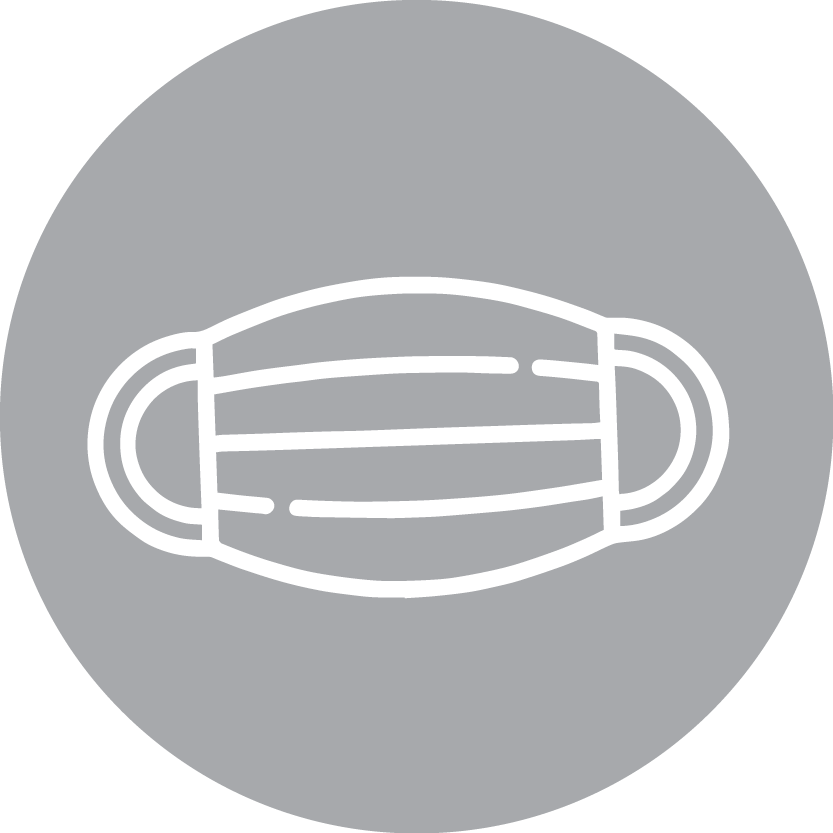
Face Coverings
a. School of Music students, faculty, and staff must wear face-masks in the School of Music building at all times (during classes and in rehearsals). Exceptions to the requirement for universal face coverings inside are limited to time spent in a single-occupancy office or practice room with a closed door. See Covid-19 Central @The U.
b. Signs, reinforcing the importance of face coverings for virus control, are posted throughout the School of Music.
c. A limited supply of disposable masks is available for students who need one. Please visit the Music Office or, after office hours, the McKay Music Library.
d. All students must wear a mask in indoor rehearsals at all times.
e. Voice, Brass, and Woodwind students must wear a customized mask and a bell-cover, as appropriate, during indoor rehearsals (see Resources below). Instrument bells should not be directed towards others.
f. In indoor spaces, all audience members must wear masks.
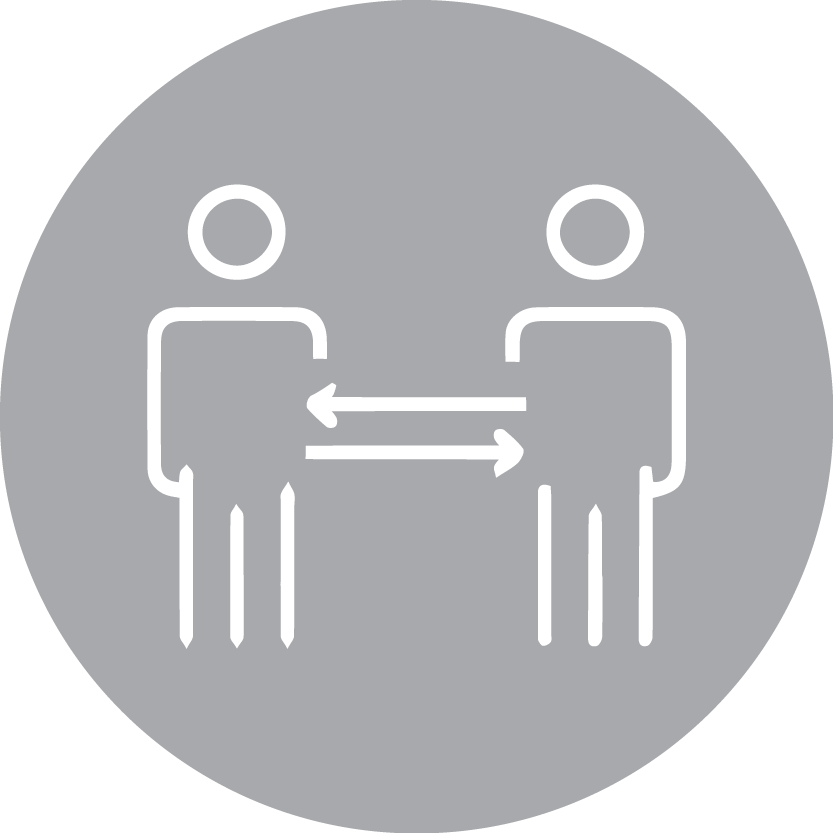
Social Distancing
a. Classroom maximum capacities and rehearsal seating plans have been redesigned to allow for social distancing.
b. Large ensembles have been split into smaller ensembles to limit the number of people per room and maintain social distancing.
c. Congregating before/after classes and rehearsals is prohibited. Faculty are requested to dismiss classes/ensembles in groups to minimize congregating.
d. Students must keep a distance of 6 feet (7.5 ft. on-center markings) between themselves and others in the School of Music building at all times (during classes and in rehearsals and performances).
e. Singers and wind instrument performers must keep a distance of 10 feet (11.5 ft. on-center markings) between themselves and other performers during rehearsals and performances.
f. Protective shields will be used in some instructional and performance spaces, as well as public desks, administrative offices, and library spaces.
g. All audiences will be by invitation-only in the School of Music until COVID-19 restrictions are lifted, and they must use designated seats, only.
h. The majority of performances this will be live-streamed.
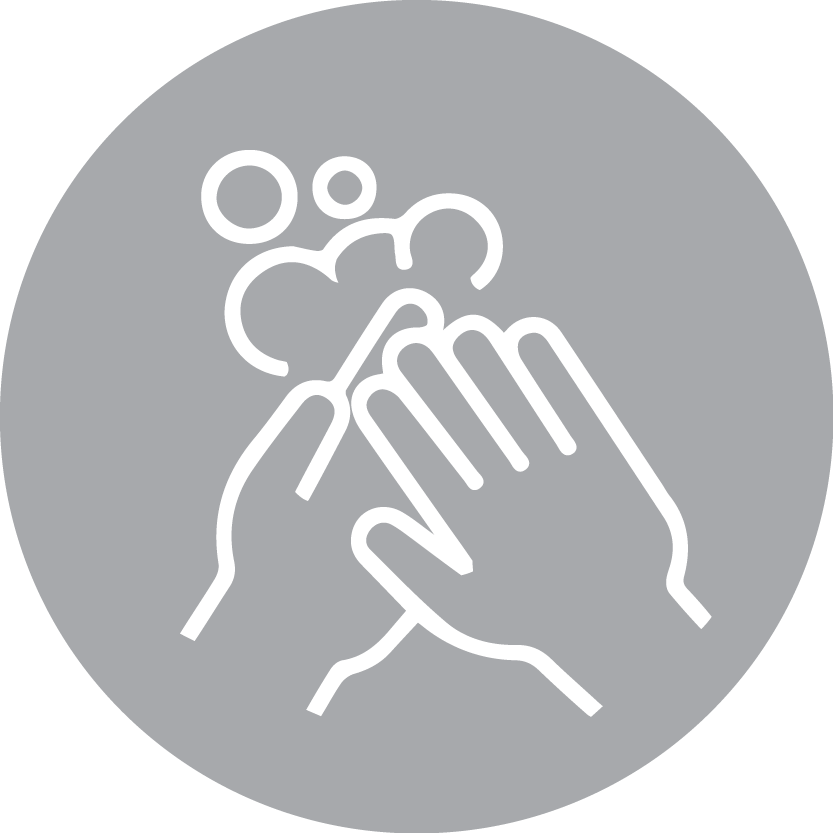
Hygiene
a. Everyone should wash their hands often with soap and warm water for at least 20 seconds, especially after they have been in a public place or after blowing their nose, coughing, sneezing, or touching their face. It is also suggested that everyone wash their hands as they enter and exit various on-campus spaces and before eating. People should also avoid touching their eyes, nose, and mouth.
b. Classrooms and other instructional spaces will be supplied with hand sanitizer dispensers and disinfecting towel dispensers.
c. Students should clean their desks and wash their hands before classes and rehearsals.
d. Students should wash their hands before and after entering a practice room.
e. Students should wash their hands before and after touching a piano, keyboard, or organ, or any other musical instrument (percussion) or device (computer, microphone, etc.) used by multiple users.
f. Students must bring their own portable music stand to school. Do not share your music stand.
g. Practice water key etiquette. Drape water valve and collect condensate in towel or WindSorb Disinfect towel/WindSorb after use.
h. Deep cleaning of the building will happen once daily, including disinfecting of high-touch areas.
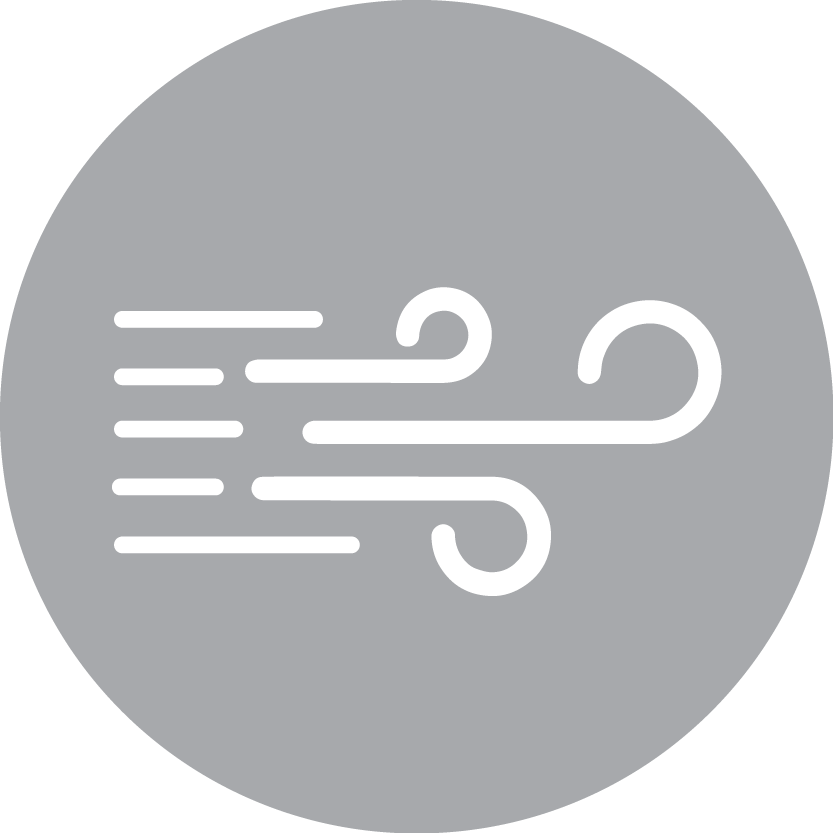
Ventilation
a. Whenever possible, outdoor spaces will be used to minimize the risk of exposure to the virus.
b. Ventilation of all spaces in the School of Music has been increased in order to maximize the exchange of air in the building. MERV13 air filters have been installed in the School of Music.
c. A 15-minute down-time between classes has been implemented to allow the air in classrooms to be exchanged.
d. In all indoor lessons, rehearsals, or performances that include voice or wind instruments, a 30-minute air-exchange period of down-time is required for every 30-minutes of rehearsal or performance. In outdoor lessons, rehearsals and performances 5 minutes of down-time are required for every 30 minutes of rehearsal or performance.
e. No aerosol-producing lessons will take place in faculty studios until the data supports their safety. These lessons may be held in-person, either outdoors or in an approved large room, or through interactive video conferencing.
f. After every practice session ends, a mandatory 30-minute air exchange period is incorporated into the practice room sign-up protocol. Students must follow all rules regarding practice room start and end times. See Practice Room Policies.
First-year and Returning Students
Information on Courses Spring 2021
The faculty have worked together to render your educative experience through a variety of instructional modalities to suit differing needs across the School of Music. Our goal is to provide the best possible educational and artistic experience for you, while safeguarding your health and safety and the health and safety of the campus community.
In-Person Courses
Because individual music instruction and performance experiences are critical components of your musical education that are best delivered in an in-person instructional modality, instruction of applied lessons, ensembles, technique courses, and repertoire studies will be in person, with strict adherence to all safety protocols.
In most courses classified as in person, students do not need to seek an official accommodation to participate online rather than in-person. In most in-person courses (and in all hybrid and IVC-hybrid courses), students may ask their instructor for an adjustment to participate in class exclusively online—with no penalty—if they so wish.
Essential In-Person Courses
However, there are some in-person courses that have been designated as "essential in-person” courses, because in-class attendance is a necessary component of these courses for pedagogical reasons. In “essential in-person” courses students are required to attend in person and adjustments will not be granted to allow online participation instead of in-person attendance.
In the School of Music, group keyboard and ensemble courses have been identified as types of courses that belong in the “essential in person” course category. Keyboard (“group piano”) courses have been classified as “essential in person” courses because they require using equipment (a keyboard) that is not normally available to most students unless they are in the School. Ensemble courses have been classified as “essential in person” courses because they include learning outcomes that necessarily require in-person collaboration with other students
If, due to a disability, you need to seek an ADA accommodation to request an exception to the attendance policy for an “essential in person” course, please contact the Center for Disability and Access (CDA). CDA will work with your instructor to determine what, if any, ADA accommodations are reasonable and appropriate.
Information on specific types of courses in the School of Music
Academic Courses
Classes in Composition, Music History, Music Education, Music Technology, and Music
Theory will be taught according to the modality of instruction listed for each class
in the Spring 2021 Schedule of Classes. In order to allow for student choice, courses
offering several sections may include sections with different instructional modalities
(in-person, IVC-hybrid, hybrid, IVC, online). As you enroll in classes for the spring,
please check the Schedule of Classes to note the specific modality of instruction
of each class section in your schedule.
Applied Lessons
Applied lessons are classified as IVC-hybrid, allowing for a mixture of in-person,
and synchronous online modalities of instruction. Students may consult directly with
their instructors regarding the proportion of in-person lessons and IVC lessons that
the instructor is planning to provide.
Keyboard Courses
Keyboard courses are “essential in-person” courses. Please plan to attend class in
person. These courses include Keyboard I (MUSC 1150), Keyboard II (MUSC 1160), Keyboard
III (MUSC 2150), and Keyboard IV (MUSC 2160). Keyboards in the keyboard labs will
be distanced. Student must wear face-masks and wash their hands before and after class.
Concert Attendance (MUSC 1000)
Concert attendance will be a combination of online and face-to-face options. The course
instructor will distribute details.
Music Education Student Teaching
Music education majors engaged in Student Teaching will follow the protocols for the
school districts in which they are placed. Masks will be mandatory for indoor on-site
learning, as well as appropriate distancing and hygiene protocols. If either the School
of Music or a school system in which our student teachers are placed discontinues
in-person instruction, the placement would continue remotely. In the unlikely event
that the school system discontinues both in-person and remote instruction or does
not allow the student teachers to participate, the student teacher would need to withdraw
from the placement.
Ensembles will present a mixture of live and online concert experiences. Please contact the ensemble director of the specific ensemble listed below for details. Ensembles are “essential in-person” courses. Please plan to attend rehearsals in person. Your ensemble director will work with you to make sure that you are comfortable at all times with the safety measures being implemented for the specific ensemble.
Ensemble directors will ensure that all ensemble activities take place in a way that attenuates risks as much as possible. In the event of a partial or complete shift to an online format, ensemble directors are planning to implement various options to facilitate an ensemble experience (such as increased physical separation, remote rehearsal technologies, and recorded ensemble performances).
Students enrolled in an ensemble must bring their own portable music-stand to all rehearsals.
In addition to the requirements of the University, the School of Music requires face coverings and, depending on the instrument, bell coverings and condensation-collection pads during ensemble rehearsals and performances. Please consult with your ensemble director and private applied instructor for specific PPE for your instrument:
VOICE
Wear customized face covering for singers.
FLUTE/PICCOLO
Wear customized face covering for flutists.
OBOE/CLARINET/ SAXOPHONE/ BASSOON
Wear mask with small slit for mouthpiece or bocal. Place MERV13 filter material over bell with hair tie/rubber band.
French Horn
Wear mask with small slit for mouthpiece. Place MERV13 filter material over bell with hair tie/rubber band and cut a slit to insert hand into the bell. To empty water keys use Puppy Training Pads or another condensation collection vessel.
TRUMPET/ TROMBONE/
BARITONE/ EUPHONIUM TUBA
Wear mask with small slit for mouthpiece. Place MERV13 filter material over bell with hair tie/rubber band. To empty water keys use Puppy Training Pads or another condensation collection vessel.
Chamber Choir (MUSC 7/6/4404)
A Cappella Choir(MUSC 7/6/4405)
Dr. Barlow Bradford barlow.bradford@utah.edu
Singers in the choirs will work in groups of 10, having each singer in a separate room that is wired for audio and video so they can hear each other in real time while seeing the conductor through a monitor. The conductor will also be able to hear and see the 10 singers. We will learn repertoire this way and eventually record each piece. The recordings will be 'stacked' so that all singers will be part of the final product.
Dr. Emily Mercado Emily.Mercado@utah.edu
Students enrolled in Voci Altissime can choose to meet online or in person. All students
are required to attend class on Mondays and Fridays, and they can choose to meet in-person
or on Zoom. Wednesdays are reserved for small group online rehearsals/discussions
and recording sessions. Voci will release three virtual concerts throughout the semester.
University/Community Ensemble (MUSC 4415)
Information pending
Opera (MUSC 7/6/4420)
Dr. Robert Breault robert.breault@music.utah.edu
Very small ensembles of singers will perform and record scenes programs in various large spaces A variety of repertoire will be chosen including opera, song, oratorio, operetta, and, musical theatre. Specific safety protocols for singers will be followed. We will also present the Verdi’s Rigoletto in a similar fashion.
String chamber groups Dr. Hasse Borup Hasse.Borup@music.utah.edu
Honors and graduate quartets will operate as normal (i.e. in-person rehearsals/coachings). IVC performance technologies to facilitate remote rehearsals are being explored (JackTrip / JamKazam, etc.) in case safety measures require a switch to online. Since the orchestras will divide into smaller chamber groups, students signing up for regular chamber music (other than the three groups mentioned above) will meet with an orchestra course but have additional syllabus requirements to fulfill chamber music learning outcomes.
Harp Ensemble Dr. Cathy Clayton C.Clayton@utah.edu
Harp Ensemble will meet in person with social distancing for one rehearsal per week.
Harpists will bring their own harps to rehearsal to avoid cross contamination with
school instruments. If a harpist does not have a harp to bring to rehearsal, arrangements
can be made for the harpist to use one of the three university harps. Harpists must
also bring their own stands and stools. The harp ensemble has a live performance (or
virtual, if necessary) scheduled this semester in Libby Gardner Concert Hall.
Flute ChoirProfessor Tiffany Sedgley tiffany.sedgley@utah.edu
Flute choir will meet in person on Thursday’s from 4-6. We will rotate from Thompson
Chamber Hall and Libby Gardner Concert Hall every 30 minutes during our two hour rehearsal
Dr. Igor Iachimciuc igor.iachimciuc@utah.edu
All students will be grouped in small ensembles. The main focus for each group will be a recording project, rather than a live performance. Each group will consist of 2-4 musicians and will meet weekly TBA for a 50-minute coaching. Depending on the number of instruments and the type of instruments, each group will meet either in person, or remotely. Students may be assigned to participate in more than one group. All recorded compositions will be streamed through the School of Music Virtual Venue.
Early Music Ensemble (MUSC 6/4437)
Professor Lisa Chaufty lisa.chaufty@utah.edu
Students will meet in small groups in multiple rooms scheduled in 30-40 minute blocks within the ensemble’s regularly scheduled two-hour time block. The instructor will provide each week's schedule as the semester progresses. This semester the Early Music Ensemble will concentrate on repertoires that explore the diversity of early music. As the semester moves forward, we will videorecord some pieces for release on through the School of Music website.
University Campus Symphony (MUSC 6/4440), Utah Philharmonia (MUSC 7/6/4445)
Dr. Robert Baldwin Robert.Baldwin@music.utah.edu.
University of Utah Orchestras (both the Utah Philharmonia and the University Campus Symphony) will be mainly comprised of string players for Spring Semester, 2021. Percussionists will join the ensembles for one recording project in February. Repertoire will be recorded for broadcast on the School of Music website. There will also be live-streamed mini-recitals for the conducting students. Musicians will sometimes rehearse in smaller cohorts and will come together for performances and recording projects. Up to three rehearsal rooms may be used for some rehearsals.
Pep Band (MUSC 4450)
Dr. Brian Sproul Brian.Sproul@utah.edu
Information pending
Symphonic Band (MUSC 6/4460), Wind Ensemble (MUSC 7/6/4465)
Symphonic Band, Dr. Brian Sproul brian.sproul@utah.edu
Symphonic Band will meet online, in IVC mode. Class meetings will be Tuesdays & Thursdays from
12:25 until 1:45. The course will discuss Wind Band History and Literature as well
as explore projects in band programming. The course is directed towards instrumental
music education majors and students with an interest in wind band literature. Students
wishing to participate in face-to-face small groups will be permitted, as space allows,
within the Wind Ensemble.
Wind Ensemble, Dr. Jared Rawlings j.rawlings@utah.edu
Wind Ensemble rehearsals will meet face-to-face in small groups, following all specific safety protocols for wind players. The instructor will notify students on the class meeting schedule.
Dr. John Petrucelli u6027228@utah.edu
Jazz Ensemble (MUSC 7/6/4470)
Jazz Repertory Ensemble (MUSC 6/4472)
Jazz Combos (MUSC 6/4475)
All of the jazz area performance ensembles, including Jazz Ensemble, Jazz Repertory
Ensemble, Michie Jazz Quintet, and the Jazz Chamber Ensemble program will be conducted
in an online, synchronous format. All performances will be recorded remotely and disseminated
via social media upon completion.
Professor Geoff Miller geoffrey.miller@utah.edu
Jazz Guitar Ensemble I (MUSC 6/4490)
Jazz Guitar Ensemble II (MUSC 6/4491)
Information pending
Percussion Ensemble (MUSC 6/4485)
Dr. Michael Sammons Mike.Sammons@utah.edu
Percussion Ensemble will meet face-to-face in small groups, following all specific safety protocols per University guidelines as well as guidelines outlined by the Percussive Arts Society. The focus of the repertoire programmed will be on smaller, chamber works which will rely on small group and individual rehearsals. The instructor will notify students on the class meeting schedule.
Classical Guitar Ensemble (MUSC 4495)
Professor Todd Woodbury todd.woodbury@utah.edu
Classical Guitar Ensemble rehearsals will meet face-to-face in small groups of four
or less. We will be following all specific safety protocols per University policies
for face coverings and distancing.
Accompanying Practicum (MUSC 6/4499)
Dr. Viktor Valkov valkov.viktor@utah.edu
Lectures will be online for the first two weeks. Then individual in-person times will
be scheduled with the instructor. Once soloist assignments are completed, only the
performer, accompanist, and structor would meet in person to ensure social distancing
and all safety protocols.
Juries, Degree Recitals and Exams
Jury Examinations
Juries will be scheduled at the end of the Spring 2021. Detailed information will
be released by applied Area Heads during the Spring Semester.
Recitals
All degree recitals must take place at the School of Music and they must follow all the safety measures required by the School of Music. Student Recitals will be live-streamed. No live audiences are allowed at student
degree recitals, except for student's instructor(s), members of a student's Graduate
Supervisory Committee, and video streaming staff. No off-campus degree recitals will
be approved in Spring 2021. Please see Student Recital Scheduling Policy.
Graduate Comprehensive Examinations
Graduate Comprehensive Examinations will be supervised by the Supervisory Committee
Chair. All meetings are to be conducted using Interactive Video Conferencing software
(e.g., Zoom).
Resources
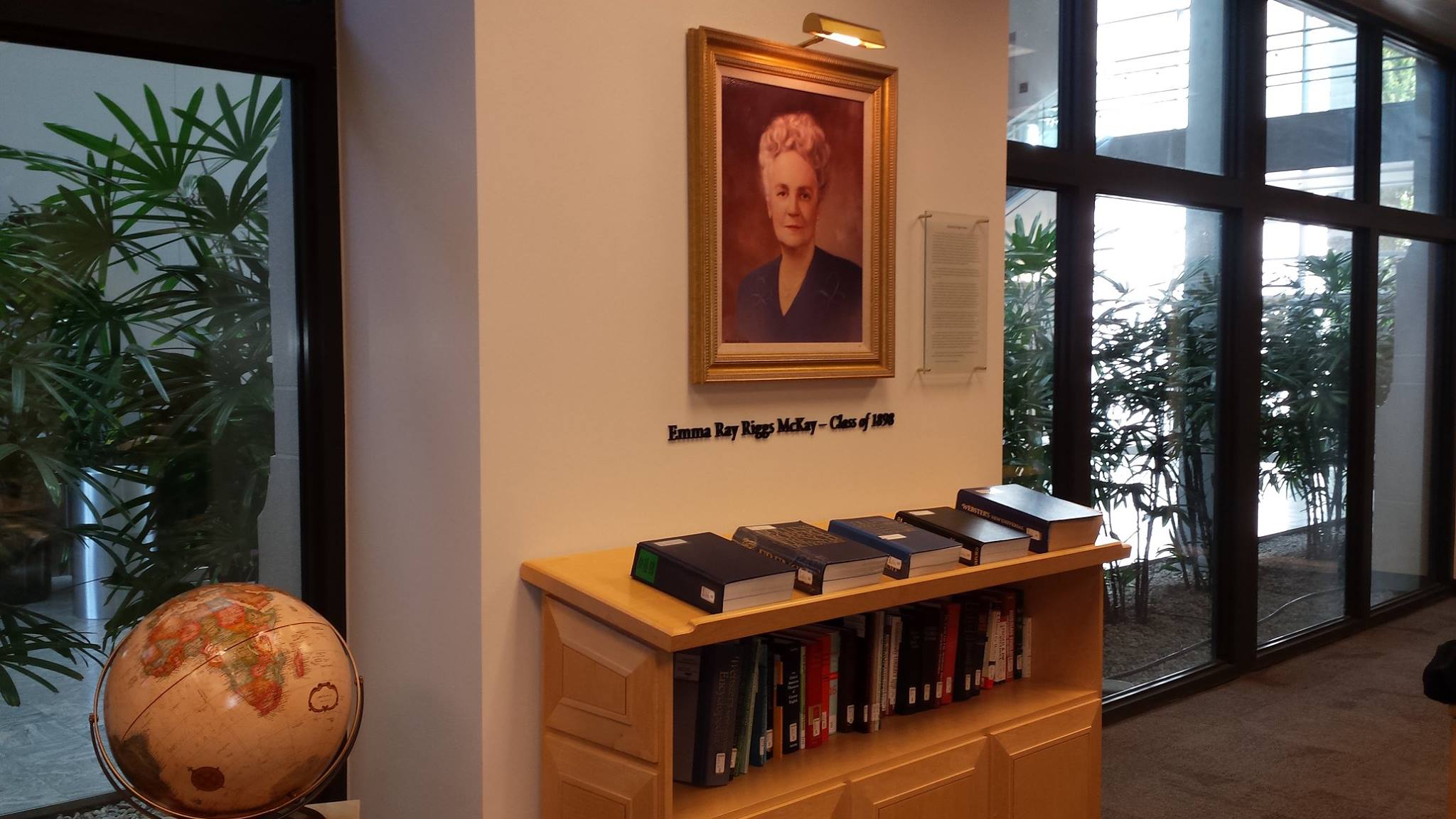
McKay Music Library
The McKay Music Library will be open regular hours while the School of Music remains
open, although the maximum capacity of the library will be reduced to enable social
distancing. Reference hours will be available as usual in person and also online for
the entire semester during the hours we are open. Requests for scans of materials
needed for online teaching or learning can be sent to mckaylibrary@music.utah.edu. For information on how the McKay Library is operating currently and during the fall
semester, please go here. Questions can be directed to Lisa Chaufty, library director at lisa.chaufty@utah.edu.
Recommended Technology for Online IVC Lessons
The following recommendations are intended to help you maximize your online lesson
experience, while keeping your cost as low as possible. If you already have an audio
and video equipment setup that provides an effective online lesson experience for
both you and your applied teacher, there is no need to purchase new software or equipment.
Computer
We strongly recommend use of a laptop or desktop computer for online lessons (both for the student and the instructor). Smartphones and tablets
will not allow the use of an external microphone, and will not allow the use of the
recommended audio and video platforms below.
Interactive Video Conferencing (IVC) platforms
We recommend the following platforms for online lessons.
1. For Video use Zoom (no cost, through the U).
2. For Audio use Cleanfeed (free). Zoom audio should be muted when using Cleanfeeed for audio. Cleanfeed is a free web-based audio platform that is a significant improvement over Zoom audio. Cleanfeed requires use of the Chrome browser. The Cleanfeed platform is recommended by the New England Conservatory Voice and Sound Analysis Lab. Teaching & Learning Technologies (TLT) does not offer support for use of the platform.
Audio Equipment
We recommend that an external microphone be used for online lessons, as the quality of a microphone is the factor that most
significantly affects the quality of the sounds that your teacher hears.
Basic Setup
These items provide a basic setup that enhances sound quality. Obtaining an external
microphone is the top priority. Headphones are a second priority. All external microphone
recommended below work relatively well with all voices and instruments.
- USB microphone (price range: $50-$150).
- Headphones: wired headphones are more reliable than bluetooth; open-back is recommended; closed-back is possible for recording applications (price ranges: open-back $160; closed-back $65-$80).
- If recording is a part of lessons, then any of the following audio editing applications is a good option: Garage Band (free), Audacity (free), or Amadeus Pro.
Below is a list of recommended models of microphones and headphones. As a general rule, USB microphones can only be used in mono with a computer.
Microphones |
Type |
Price |
|
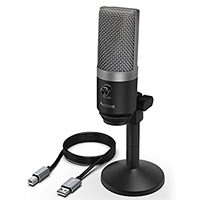 |
Fifine K670 USB | Condenser | $56 |
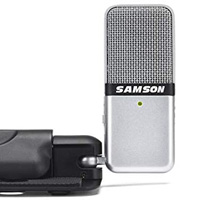 |
Samson Go Mic USB | Condenser | $50 |
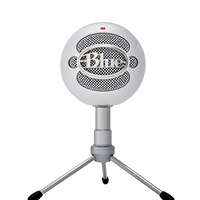 |
Blue Snowball USB | Condenser | $50-75 |
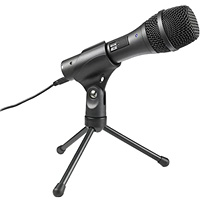 |
Audio-Technica ATR2005 USB | Condenser | $80 |
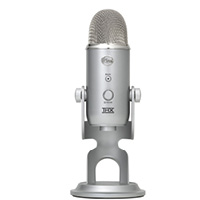 |
Blue Yeti USB | Condenser | $100 |
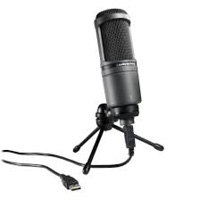 |
Audio-Technica ATR2020 USB | Condenser | $149 |
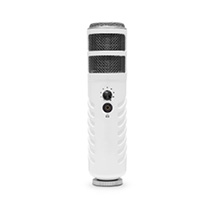 |
Røde Podcaster USB | Condenser | $229 |
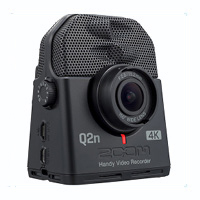 |
Zoom Q2n-4K Handy Video Recorder | Condenser | $220 |
Headphones |
price |
|
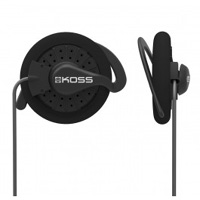 |
Koss KSC 35s |
$45 |
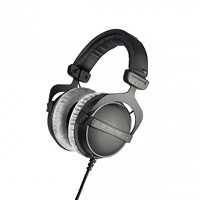 |
Beyerdynamic DT 770 |
$150 |
Advanced Setup
The items below provide a more sophisticated and nuanced setup that could serve as
the core of a home-recording studio setup. If you are going to invest long-term in
music technology for your career as a professional musician, we recommend a stereo audio interface and two microphones. Using the equipment recommended at this level requires more technical expertise
and preparation, but it is not necessarily much more expensive than the basic setup
described above.
A laptop or desktop computer is required for this setup, with an audio interface, standard microphones, and microphone stands and cables. With an audio interface, a wider variety of microphones can be used than in a basic setup.
1. Two standard condenser microphones (Rhode M5, AKG C3000, or equivalent), cables, and stands. You can also set up an ORTF stereo pair (typical price for two microphones, cables, and stands: $600)
2. Audio interface (Scarlett 4i4 or equivalent) - Note: make sure the interface purchased is compatible with your computer’s operating system. (price range: $100-$400)
3. Headphones: same as above (price ranges: open-back $160; closed-back $65-$80).
4. Audio editing applications: Garage Band (free), Amadeus Pro, Logic Pro ($199), or Ableton Live ($269)
Where do I find this equipment?
American Musical Supply, Performance Audio, Sweetwater
Questions?
If you have questions, please contact Dr. Mike Cottle at D.Cottle@utah.edu. Please use your Umail (@utah.edu) account. The University of Utah requires all students, faculty, and staff to use Umail when communicating about official University business. In addition to Umail, each student and faculty member needs to have access to Canvas, the University’s selected learning management system. The School of Music recommends that you have daily access to both Umail and Canvas.
Facilities
Study Spaces for Students
Students that need spaces to study and attend IVC classes are available within and
around David Gardner Hall. In addition to McKay Music Library, students are welcome
to utilize the Bruce Bastian Atrium and the sound lock spaces on the east and west
sides of Libby Gardner Concert Hall. Informal outdoor spaces are available around
David Gardner Hall and Presidents Circle.
Reed-making Room
The Reed-making Room is closed this fall to students.
Practice Room Spaces
Students are able to electronically register for one hour of time practice time per day.
Practices rooms will open on Monday, August 24, 2020 at 7:00 a.m.
FAQs
If you have questions not addressed here, please email j.rawlings@utah.edu Dr. Jared Rawlings, Associate Director—your patience is appreciated. Additional information is shared weekly.
New Student Orientation
Q: When does orientation start?
A: Virtual orientation is underway with synchronous activities. Schedules will vary
– some sessions will be specific to your academic status. For more information, please
visit the University of Utah's Orientation page.
Student Recitals
Q: Can I give my degree recital in the Spring semester?
A: Yes! Students who need to perform recitals rescheduled from the Spring 2021 semester
will have a priority scheduling period of time. All rescheduled recitals must be completed
this semester. All other students will be able to schedule degree recitals.
International Students
Q: How should I interpret the most recent action and guidance from the Student and
Exchange Visitor Program?
A: Please visit the U statement on Student and Exchange Visitor Program
For more information visit University of Utah’s Covid-19 Central @theU
Calendar
Q: Why isn’t there a Spring break?
A: Eliminating spring break gives us enough instructional time to start a week later
(January 19, 2021), providing a greater opportunity for travel arrangements at a busy
time of year, in addition to minimizing travel exposure to the community at spring
break.
Q: When will class instruction fully shift to online?
A: Sunday, March 1 to Sunday, March 14.
Q: When are final exams?
A: Final examinations will be held from Thursday, April 29 to Wednesday, May 5
Q: When will the Spring semester start?
A: The regular academic calendar lists classes starting on January 19, 2021.
Courses
Q: How will I take classes at the School of Music?
A: Music coursework will be offered in multiple modes of delivery – meaning some elements
will be available in-person, on interactive video conference software (e.g., Zoom),
and online. Each course was adapted to the space available and learning outcomes,
prioritizing the safety of all students and faculty.
Q: I am concerned about my health and safety if I come back. Can I enroll online this
Spring?
A: We understand that some students are at higher risk of negative health outcomes
from COVID, or must stay in close contact with those who are. Options are in place
for students to complete remote programming.
Q: I don’t want to wear a face covering? Do I really have to?
A: Yes! Students who disregard the requirement to wear face coverings may be in violation
of the Student Code and can be referred to the Office of the Dean of Students. Faculty
and staff are encouraged first to discuss concerns with the student(s) involved; however,
when appropriate, they may refer a student to the Office of the Dean of Students at
801-581-7066 or deanofstudents@utah.edu. University community members may also submit
an online report via the reporting link at https://deanofstudents.utah.edu. Repeated
violations of the Student Code are subject to more progressive sanctions up to and
including written warning, probation, and suspension from the university. Students
who repeatedly or deliberately violate the Student Code may also forfeit the opportunity
to participate in on-campus courses.
Lessons
Q: Is it safe to take my lessons in person?
A: Lessons and other one-on-one activities will be performed safely in School of Music
studios and classrooms. Protective shields are installed in instructional spaces to
ensure protection, appropriate distances will be marked and maximum occupancy signs
will be posted for each space.
Q: How will I be able to practice?
A: The most important measure you can take to practice safely in a practice room is
to wash your hands before and after practicing, especially if you used the piano.
In the interest of all user’s safety, new scheduling and cleaning requirements continue
to apply to all practice rooms.
Q: Will I be able to play in a large ensemble this Spring?
A: Yes! There will be several concerts and additional programming to ensure a musically
rigorous experience. For non-wind instruments, face coverings will be required.
Q: How will we all fit safely on stage?
A: After measuring Libby Gardner Concert Hall for appropriate distancing, we are evaluating
options for small chamber ensembles. Additional programming that doesn’t include traditional
small or other chamber ensemble configurations is also being developed to ensure that
students are able to engage with repertoire in a meaningful and safe way.
Q: How will ensemble placement auditions work?
A: We do not have a spring semester ensemble placement audition. If you have questions
about enrolling in an audition-only ensemble, please contact the course instructor.
Q: What if I don’t feel safe in a large group setting?
A: The School of Music will follow and seek guidance on an ongoing basis regarding
best practices for safe rehearsal and performance in ensembles. Those with concerns
about participating in socially distanced ensemble activities should reach out to
Dr. Jared Rawlings, Associate Director of the School of Music, at j.rawlings@utah.edu
Q: Will I be part of a chamber ensemble? Will we receive in-person coaching?
A: Chamber ensembles are a component of the School of Music experience. Groups formed
by the Area Heads during the first weeks of the semester, and all students enrolled
in chamber music, will receive their faculty coaching sessions and performance opportunities.
Q: Is it safe for my group and coach to work in a studio?
A: All studios and instructional spaces will be measured and marked to identify maximum
safe occupancy for ensembles rehearsals and coachings of various configurations. The
School of Music will monitor the evolving guidance regarding appropriate distance,
etc., for ensembles and adapt studio configurations as needed. Face coverings will
be required.
Q: Will there be a fully staged Opera this Spring?
A: A fully staged opera production is planned for Spring 2021, most likely to be presented
online only.
Q: What will the Spring Opera scenes look like?
A: Planning is underway now, with an emphasis on maintaining high artistic standards
as we consider repertoire that suits the conditions and use of technology. More details
will be shared with singers as they are available.
Q: What screening is necessary to enter David Gardner Hall?
A: At this time, we are asking that everyone conduct a self-assessment on their general
health and recent travel before entering the building. Temperature screenings are
recommended upon entry, and anyone with a fever of 100ºF/38ºC must immediately leave.
A face covering (e.g., mask) that covers the nose AND mouth must be worn at all times
in shared spaces. This screening is subject to change at any time, but it is best
to plan for these steps to be in place for some time.
Q: How will scheduling work for practice rooms, studios, and larger spaces?
A: Practice rooms will be assigned specific spaces and times on a weekly schedule.
On the other hand, we expect to have space available thanks to many of our courses
this spring being delivered in online or hybrid formats. See Practice Room Policies.
Q: How will guests and other external stakeholders be managed?
A: The University has instructed all units, including the School of Music to not allow
any persons external to the University to use University facilities until the level
of transmission of the virus decreases.
A: We are monitoring the guidance from federal and local agencies regarding the safety of visitors and patrons both on university campuses and in live performance venues. At this time, we do not know when audiences will be invited back to our concert halls. However, we are pleased to continue to livestream and broadcast our performances in Libby Gardner Concert Hall and Dumke Recital Hall.
Q: I’m giving my student recital this fall – can my family attend in person?
A: Currently, no live audiences are allowed at student degree recitals, except for student's instructor(s), members of a student's Graduate Supervisory Committee, and video streaming staff. No off-campus degree recitals will be approved in Spring 2021. Please see Student Recital Scheduling Policy. For now, we recommend that your family and friends plan to watch via the livestream.

